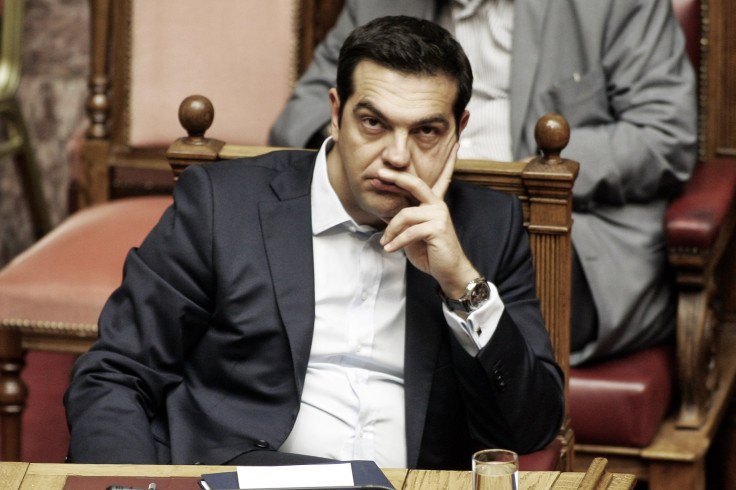Pragmatic Tsipras Postpones Greek Revolution, Trouble Lurks

ATHENS (Reuters) - Listening to Greek Prime Minister Alexis Tsipras and his re-elected leftist government, you would think the revolution had been postponed, not canceled.
That makes it hard to answer the 64-million-euro question on the minds of policymakers and investors in Europe and beyond: has Greece finally emerged from six years of economic and political crisis, or is this just another false dawn?
To be sure, Tspiras has largely jettisoned the anti-austerity rhetoric with which his Syriza party swept to power in January, taking Greece to the brink of economic collapse and ejection from the euro currency within six months.
The tie-spurning prime minister, 41, now says Greece must, as fast as possible, implement painful economic changes, spending cuts and tax rises contained in the bailout program he finally accepted in August, so that it can return to a radical social agenda in the second half of his four-year term.
"This is the first Greek government to be elected with the pledge to implement, not tear apart or renegotiate from the start, the bailout program," Athens University economistGeorge Pagoulatos said in an interview.
Moreover, the main center-right and center-left opposition parties, squabbling over their future after their election defeat, also back the plan.
Diplomats and Greek analysts expect a honeymoon for the rest of this year in which the government passes an orthodox budget and enacts a giant reform package to ensure it secures the next 3 billion euro ($3.4 billion) installment as well as funds to recapitalize its ailing banks, and negotiations on debt relief.
But trouble lurks next year when painful changes to pensions, labor law and public services have to be implemented by a weak and demoralized state administration, tax increases and benefit cuts eat into purchasing power, and inflated hopes for the debt talks risk souring into disillusionment.
Given the reluctance of Germany and other north European creditors, official debt restructuring is likely to be limited, gradual and tied to conditions that could erode public support for Tsipras.
Doubts remain about the competence of some ministers and their lack of an entourage of experienced technocrats to make the bureaucracy carry out the required policies.
"I'm afraid they don't have the confidence or the staff to implement the program even if they believed in it themselves," said Yannos Papantoniou, a former reforming Socialist finance minister who helped prepare Greece for joining the euro.
Adding to his headaches, Tsipras faces pressure to tighten border security and slow the flood of migrants and refugees entering from Turkey and crossing Greece to northern Europe, although this may give him some leverage in seeking EU funds.
TIME TO INVEST?
The government expects the recession this year and next to be shallower than the 2.3 percent contraction officially forecast for 2015 and 1.3 percent for 2016. But earlier recovery will need a return of confidence and investment lacking so far.
On a visit to the United States this month, Tsipras declared he had restored political stability, ended the debate about a possible Greek exit from the euro and won a mandate to carry through difficult reforms. He urged investors to pile in.
But an attempt to harness his youthful charm and stumbling English to the charisma of former U.S. president Bill Clinton to attract international capital fell flat when Tsipras fell back on platitudes about Greece being the birthplace of democracy.
He told parliament last week he would not let foreign 'distress funds' come to Greece to buy up non-performing loans and scour the balance sheets of the four major banks. But the government has offered no alternative solution so far that would free them to lend again to healthy businesses and households.
Obstacles ranging from trade union and local authority protests to court action and political backtracking have deterred potential buyers of ports, airports or public real estate.
IDEOLOGICALLY AVERSE
Chafing under pressure to pay down Greece's debt, the government is determined to avoid fire sales and remains ideologically averse to privatization.
Canadian miner Eldorado
How the bank recapitalization is carried out is crucial to restarting the economy. If shareholders and senior bondholders are severely hit and the banks nationalized, they argue, it will deter future investment in Greece.
If the capital shortfall is well below the 25 billion euros initially feared, and a fair burden-sharing deal can be found to plug the gap, then capital controls imposed in June can be phased out, some of the 40 billion euros Greeks hid under mattresses may return to the banks and business will be able to function again.
Jens Bastian, an investment consultant and former member of the European Commissiontask force that was helping Greece until Syriza kicked it out, says foreign investors are more interested in buying up banks' liabilities than risking share capital.
"There are two different issues," Bastian, who works for the MacroPolis consultancy, said in an interview. "How (Greek leaders) behave under the (bailout) memorandum and how they behave when they are not bound by the memorandum and can act in a manner inimical to foreign investment."
So while Tsipras has the best chance of any Greek leader in a generation to engineer a genuine economic transformation, he will need to drop more ideological ballast and provide long-term vision, competence and tactical political skill to meet the challenge.
($1 = 0.8807 euros)
© Copyright Thomson Reuters 2024. All rights reserved.





















